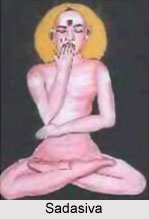 Sadasiva Brahmendra was a saint, a composer of Carnatic Music and an Advaita philosopher who lived near Kumbakonam in the Indian state of Tamil Nadu during the 18th century. He mainly composed in Sanskrit language. Only a few of his compositions have survived but they are recognized as great compositions of Carnatic Music
Sadasiva Brahmendra was a saint, a composer of Carnatic Music and an Advaita philosopher who lived near Kumbakonam in the Indian state of Tamil Nadu during the 18th century. He mainly composed in Sanskrit language. Only a few of his compositions have survived but they are recognized as great compositions of Carnatic Music
Life of Sadasiva Brahmendra
Sadasiva Brahmendra was born to Parvati and Mokshasomasundara Avadhaani. His previous name was Sivaramakrishna. He was also married at the age of 17. Sadasiva Brahmendra lived in a village named Kumbakonam located in the Indian state of Tamil Nadu, in the 17th and 18th century. He also left his home and went to Kanchipuram.
He was delightfully guided to go to the Upanishad Brahman Mutt at Kanchipuram to Sri Paramasiva Brahmendra, who was presiding over the Mutt at that time. It is said that later, after Sannyasa, he wandered around, naked or semi-naked, and often in a trance-like state. He often meditated and was reclusive, and was described as being in a "supremely intoxicated state".
On the river banks of Cauvery in Mahadhanapuram, he was asked by some children to be taken to Madurai, more than 100 miles away, for an annual festival.
The saint asked them to close their eyes, and a few seconds later they were reopened their eyes and found they were in Madurai. He also wrote the Atma Vidya Vilasa, an advaitic work.
There is an epilogue to this story. The next day, another youth, incredulous at hearing this story, asked Sadasiva to take him also to this festival. It is said that the youth immediately found himself in the distant city. When it was time to return, Sadasiva was nowhere to be found. The youth had to make his way back on foot.
Whilst relaxing near a heap of grains, he began meditating. The farmer who owned the land mistook Sadasiva for a thief, and confronted him. The farmer raised his stick to hit the saint, but became a statue. He remained in this state until the morning, when Sadasiva finished meditating and smiled at the farmer. The farmer was restored to his normal state, and asked the saint for forgiveness.
At another time, while meditating on the banks of the Cauvery River, he was carried away by a sudden flood. Weeks later, when some villagers were digging near a mound of earth, their shovels struck his body. He woke up and walked away.
After a long time since the incident occurred, almost everybody had forgotten about the entire episode of naked monk wandering in their lands, the Sannyasi was seen walking right through a Muslim harem of Nawab. As a Brahma Janani who always views Brahman, he would not differentiate between the different human figures which cross his path nor would he be distracted by the sights or noises that his environment may present to him. It was actually in this particular stance of trance that he was also walking along. He, the naked Sannyasi, walked straight into the harem, entering it at one end and walking out at the other all the while walking through a maze of inmates of the Nawab`s harem. The news reached the Nawab, he had his men chase him, and they cut off both his hands as he was walking along, the hands fell off and ... still he was walking along silently as if nothing had happened. The Nawab got scared, picked up the hands that had been severed, ran to the Sage and offered them in total remorse. The sage stopped his walking, the severed hands were restored to their place, the hands became normal and the sage walked away! There was no conversation. He attained Jeeva Samadhi at Nerur (Tamil Nadu), about 100 km West of Thiruchirapalli district.
Songs Composed by Sadasiva Brahmendra
Sadasiva is the author of many Sanskrit works that include Advaita rasa manjari, Brahma tattva prakaashikaa and Yoga sudhaakara. He also indulged in writing numerous compositions in Carnatic Music to spread the advaita philosophy among common people. Most of his compositions are very popular and can also be heard regularly in concerts of Carnatic music. Some of these are Bhaja Raghuviram (Raga Mohanam), Bhajare Gopalam (Hindolam), Manasa Sancharare (Sama), Sarvam Brahmamayam (Madhuvanti), and Pibare Ramarasam (Ahir bhairav)




















